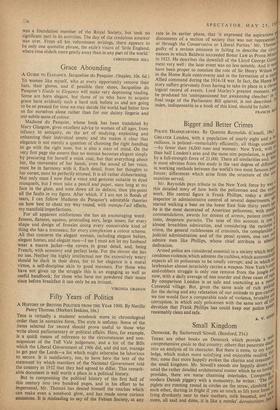Fifty Years of Politics A HISTORY OF BRITISH POLITICS FROM
THE YEAR 1900. By Neville Penry Thomas. (Herbert Jenkins, 16s.) This is virtually a students' notebook more in chronological order than in narrative form. The style is unfussy. Some of the items selected for record should prove useful to those who write about parliamentary or political affairs. Here, for example, is a quick means of reference to the circumstances and con- sequences of the Taff Vale judgement, and a list of the Bills which the Liberal Government of 1906 did, and did not, manage to get past the Lords—a list which might otherwise be laborious to secure. It is satisfactory, too, to have here the text of the statement by which members of the National Government told the country in 1932 that they had agreed to differ. This remark- able document is well worth a place in a political history. But in compressing the political history of the first half of this century into two hundred pages, and in his effort to be impersonal, Mr. Thomas has denied himself the touches which can make even a notebook glow, and has made some curious omissions. It is misleading to say of the Fabian Society, at any, rate in its earlier phase, that it expressed the aspirations ot discontents of a section of society that was not represented or through the Conservative or Liberal Parties.' Mr, Thornas guilty of a serious omission in failing to describe the circ,si stances in which Baldwin succeeded Bonar Law as Prime MI1115 in 1923. He describes the downfall of the Lloyd George Gove, ment very well: the later event was no less notable. And it v'T'' have been proper to mention the role of Sir Henry Wilson e,4 in the Home Rule controversy and in the formation of a 110„w Allied command during the 1914-18 war. In fact, the Home t` story suffers grievously from having to take its place in a 010 logical record of events. Lord Morley's greatest moment,.wt he produced his 'unimpassioned but awakening clencher' 111 final stage of the Parliament Bill quarrel, is not described. index, indispensable in a book of this kind, should be fuller. FRANCIS 13










































 Previous page
Previous page